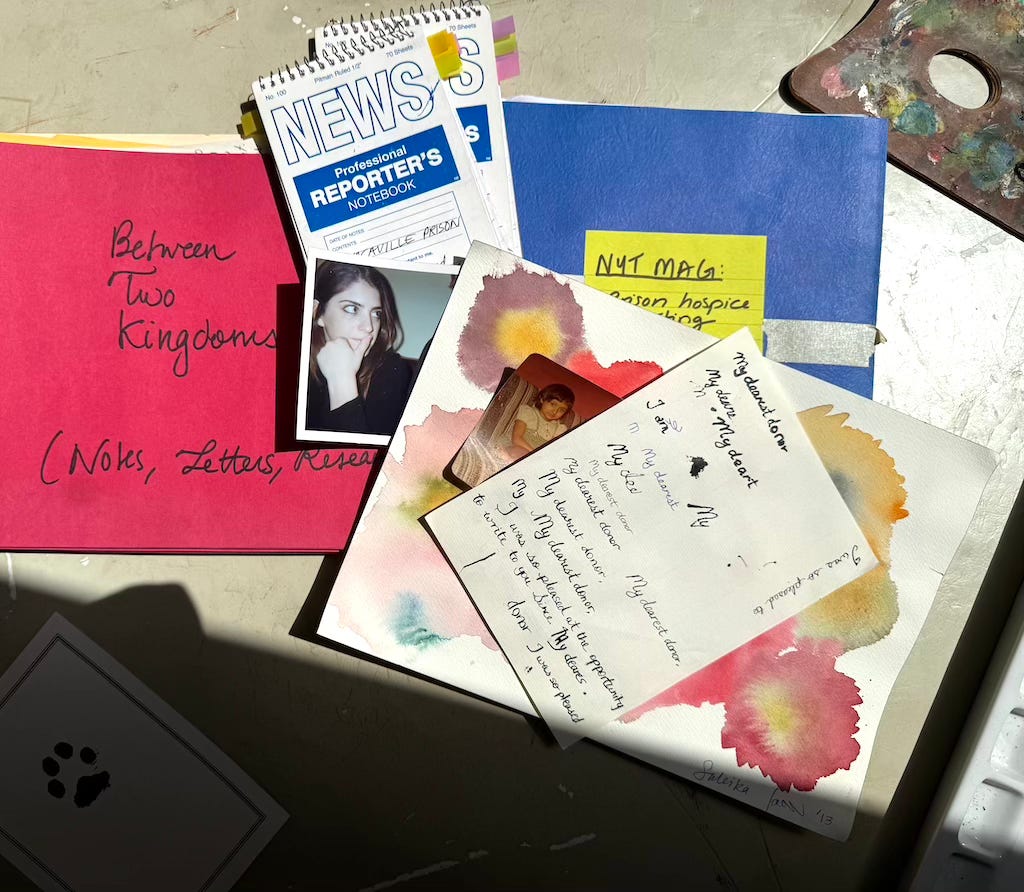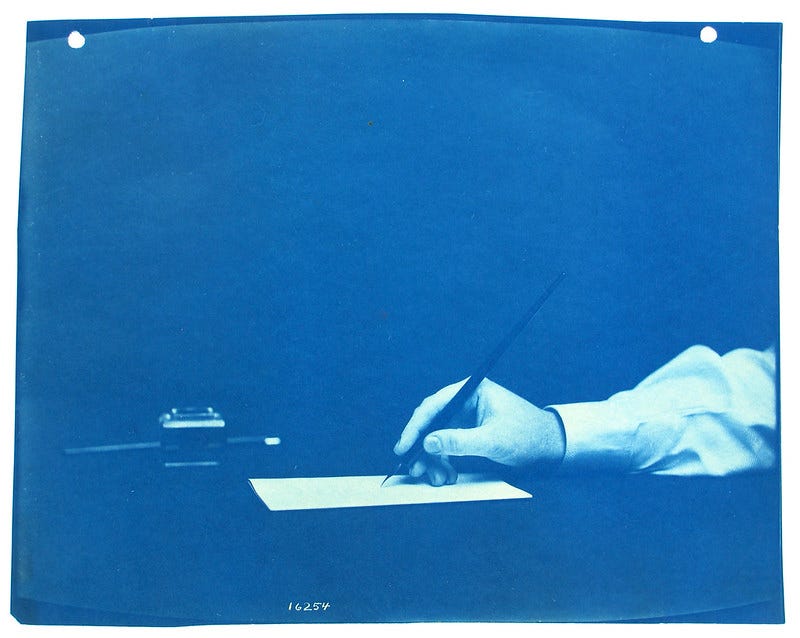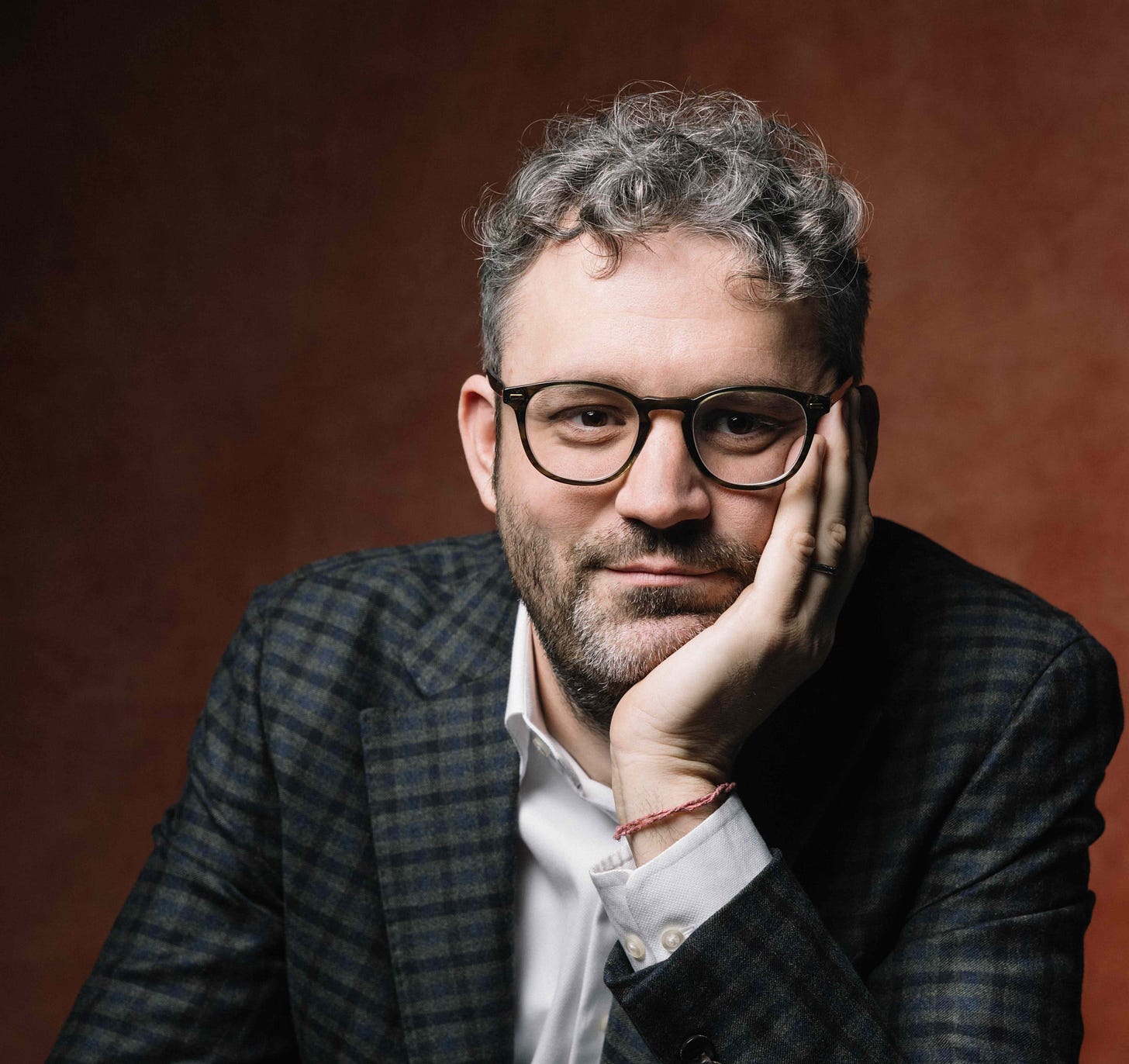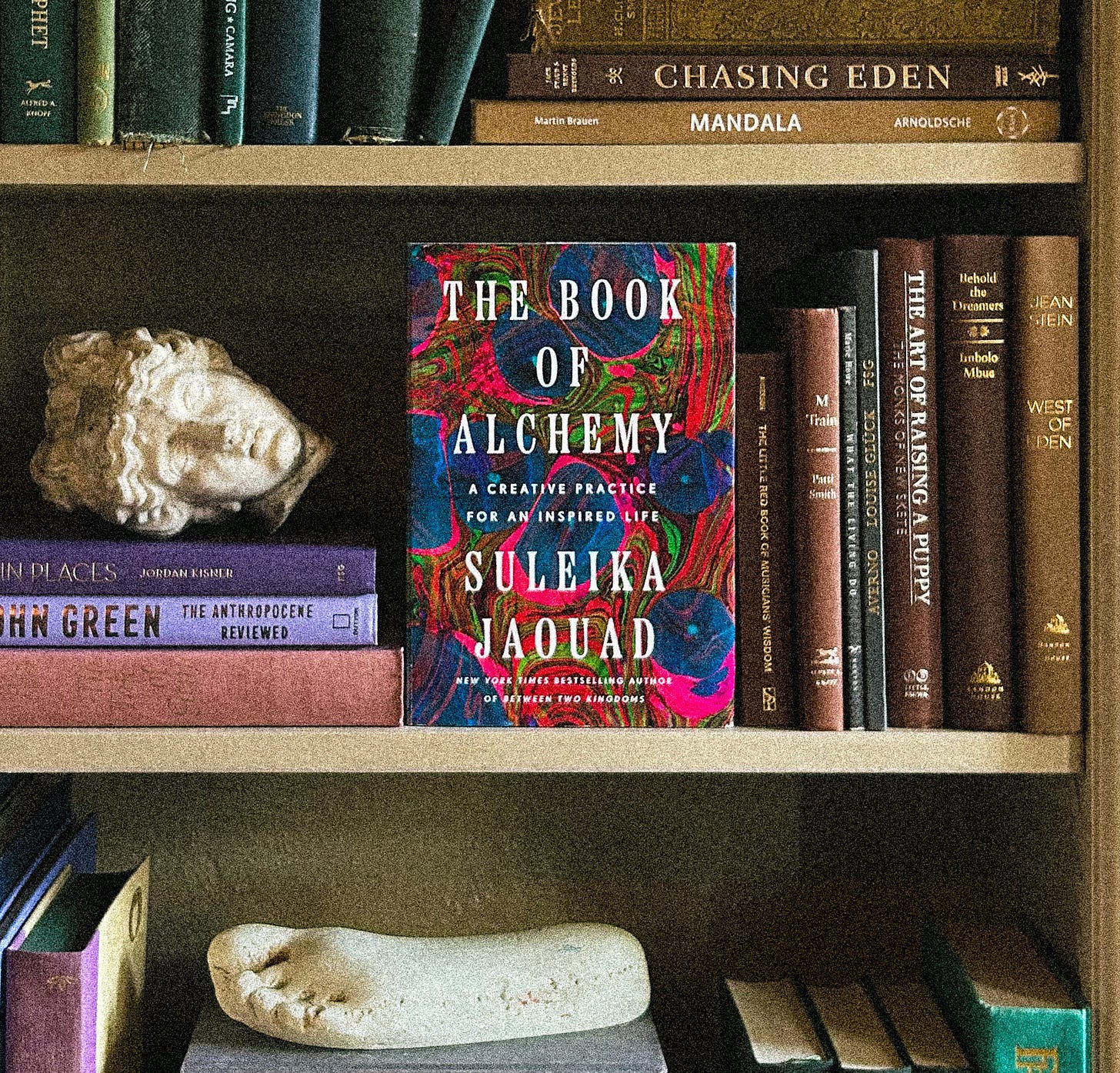The Great Decluttering & a (kinda vulnerable) video post
& wrestling demons & writing as spirit
The great decluttering continued this week, and what I’ve uncovered in these stacks and boxes runs the gamut from “Why the hell would I ever keep this?” to “I will quite literally take this to my grave.”
On the why-the-hell end: My Psychology 101 notes from freshman year of college (do you still have yours too? should we organize a group bonfire?), a grocery list from 2010, bass rosin from middle school that had melted all over some pencils, a Y2K-era yearbook where all the inscriptions were addressed to someone named Carli, and a business card for a handyman in a state I’ve never even visited. (I truly do not understand.) On the to-keep-forever side: Old reporter’s pads, a love note from a stranger on a plane, a folder with my first handwritten drafts of Between Two Kingdoms, and a yellowed envelope.
Curiously, the envelope was addressed to me—but in my own handwriting. It had been signed, sealed, and delivered, but it had never been opened. Initially, I was perplexed. I’m not in the habit of writing myself letters, and I have a hard enough time going to the post office for urgent mail matters. I wondered, What could this possibly be?
Then, as I tore open the flap, I had that vertiginous feeling of time travel. I was transported to my first days of graduate school in the summer of 2018. The writers Brian Blanchfield and Melissa Febos had everyone in our workshop write a letter to their future self at a creative low point. It was the same exercise I wrote about last week—the one that I had given to those six young women I taught creative writing to at a high school in Ojai, California. I had completely forgotten that I did the assignment myself first, and that I’d then reprised a version of it in my own classroom. How strange it was to have all this come flooding back. To suddenly become that student I was imagining, to be the one receiving my letter so unexpectedly after such a duration. I felt a thrill of anticipation, and some anxiety too. What would seven-years-ago me have to say?
And it turns out, seven-years-ago Suleika was prescient. She knew exactly what I would need to hear. “There have been too many moments to count where I’ve noticed you reaching outward for validation, for wisdom,” she wrote. “I see you wanting to please, to be a good student.” She counseled me to play, to follow my own intuition.
I felt slightly deflated at first. Earning the A, getting the gold star—these are things I still wrestle with. In fact, I’ve gotten even better at it—which is to say, I’ve gotten worse. As time has passed and the stakes have gotten higher, in many ways I feel less liberated from my perfectionistic, people-pleasing tendencies. I’m still tying myself up in the same knots. This points to a lack of progress, I thought. I’ve done all this work on myself. Why have I not improved?
But reading the letter, I was also struck by a phrase I used, not once but twice: As I know you know. First it was, “As I know you know, no good, true, subversive work was born out of a desire to please.” A little later, “As I know you know, this is where the good shit lies.”
It was so empowering to hear that trust in myself, in my own intuitive knowing. With that, my thinking shifted—from feeling frustrated that I’m still stuck in years-old patterns, to remembering that learning the same things over and over again is part of being human, and also that we all have a chorus of voices in our heads, some of them demon-esque and self-abusive and unproductive, and some of them ever-knowing and encouraging and instructive.
Such a realization is both comforting and unnerving, in that it implies a certain amount of agency. You don’t need some major breakthrough or a-ha moment. You actually just need to heed what you already know. You need to quiet the unproductive voices so you can listen to that knowing—and return to it when inevitably you stray.
I did something I’ve never done in this newsletter before and made a video post of myself where I share my full letter:
It’s a new format for me and it made me feel a little vulnerable, so I’m only making the video available to paid subscribers. If you too are feeling uninspired—or worried about taking risks and failing, or disconnected from your intuition, or like you just can’t take a full, deep breath—my hope is that, at the very least, you’ll feel a little less alone.
Which brings me to today’s essay and prompt from the writer Jayson Greene. It feels like a lovely rhyme that I get to share Jayson’s words with you this week, as we first met in graduate school, and he’s not only a dear friend but someone I look to for solidarity when those unproductive voices start their chatter. We later formed a writing group, where I had the privilege of reading the early pages of Jayson’s gripping, tender, gorgeously written novel UnWorld (out this week!). The essay that Jayson penned for us, “Writing Is Spirit,” is about how writing connects us—to ourselves, to each other, to the world, and helps us navigate loss and longing. May it inspire you to keep putting pen to page.
Some Items of Note—
We’re gathering for our virtual creative hour for paid subscribers today—that’s Sunday, June 22 from 1-2pm, to write and explore together.
and will be co-hosting this time—they’ll both share a passage from literature that delighted them recently and two very special prompts inspired by it. Find everything you need to join us here!Merch alert! In addition to limited stock of the Book of Alchemy tote and the Wonder sweatshirt, by popular demand we’ve brought back the Isolation Journal No. 1. Get yours here!
Prompt 343. Writing Is Spirit by Jayson Greene
Writing is a spiritual practice. Of course. We can all agree on this. What else do we gather here for? Writing is spirit.
Isn’t it?
I mean, it has to be, right? Man, why else would we do this? It must be. Isn’t this an act of devotion? Am I not praying?
Like all true spiritual practices, writing doesn’t feel that way, most of the time.
When the night is dark, and the page is blank—or worse, when the midday sun is shining through a window on your back while you hunch over a document, filled in every direction with meaningless symbols, with nonsense—you will be visited by a series of demons. They will come to you, grinning, armed with the world’s most insidious weapon: valid complaints.
DEMON ONE: Writing is exhausting in the wrong way. At least manual labor rewards the body with the release of endorphins. But you are neither uprooting nor planting, neither lifting nor transporting, neither cleaning nor dirtying. Whatever hole you are digging, it is inside your mind and it will bury you. It is neither artistically fulfilling nor productive. You should stop.
DEMON TWO: Writing is discouraging. Good lord, was there a point? This panicked voice issues forth its wild-eyed cry deep in the writing process, waiting for the precise moment to deploy in order to maximize cortisol saturation. This is neither artistically fulfilling nor productive. You should stop.
DEMON THREE: Writing is—yes—isolating. No, I did not make that great concert. No, I didn’t make it to the neighbor’s party. Why? Because I decided this was the weekend I would break through the dead spot in my novel. Did I? Well, no, actually, I didn’t, not quite. This process is neither artistically fulfilling nor productive. I should stop.
And yet.
Recently, I found myself standing with the rock musician Ben Kweller at the gravesite of his teenage son, weeping softly while the sun filtered through branches. Ben Kweller laid his hand on my shoulder, murmuring. Why was I here, and how did I find myself in this position?
It was my writing, the invisible hand moving through my universe, that maneuvered Ben and me into place.
When I work with a bereaved woman, someone who is not a professional writer, toiling at a manuscript about the overdose of her adult daughter, I read something in her tenth draft that chills me with revelation. We get on a Zoom, and she breaks down crying, her face filling my screen, and she flashes a beatific smile into the eye of her laptop:
What put us in this space together?
The demons arrive at every spiritual crossroads. They are tests. You are meant to face each and every one:
Yes, writing is exhausting.
Yes, writing is discouraging.
But never let the demon convince you that writing is isolating. Writing is a force in the world that moves you closer to everyone who has ever lived. Writing is admission and fellowship in human society. Writing is the only answered prayer I have ever made.
Take it from me, bloodshot and tired as I am—get up, stretch. Open a window, let the breeze hit you for a moment. Say hello to a passerby. And then, once you’ve felt the oxygen travel into your limbs, go back and sit back down. What you’re doing isn’t just productive and artistically fulfilling. It is the deepest work of spirit.
Don’t stop. Ever.
Your prompt for the week:
Write a letter to yourself at a creative low point. Wrestle with your demons to quell them, to quiet them, to exorcise them. Say what you’ll need to hear to keep going.
Today’s Contributor—
Jayson Greene is the author of the memoir Once More We Saw Stars and the novel UnWorld. He lives in Brooklyn with his wife and son.*
*As evidenced by Jayson’s bio—which officially holds the record for the shortest bio for any contributor since beginning this newsletter more than five years ago—he abhors self-promotion, so let me be his guerilla publicist for a moment and share with you the words of praise I have for his beautiful novel:
“Gripping, tender, haunting, and so gorgeously written, UnWorld is a staggeringly beautiful debut novel. With nuance and subtlety, with grace and deep feeling, Jayson Greene writes about the most ancient of human stories of love and grief, alongside the pressing, hypermodern concerns of the digital age, like artificial intelligence. On an idea level, on an emotional level, and on a sentence level, I was entranced.” —Suleika Jaouad
The Book of Alchemy: A guide to the art of journaling—and a meditation on the central questions of life
Whether you’re a lifelong journaler or new to the practice, The Book of Alchemy gives you the tools, direction, and encouragement to engage with discomfort, ask questions, peel back the layers, dream daringly, uncover your truest self—and in doing so, to learn to hold the unbearably brutal and astonishingly beautiful facts of life in the same palm. If you haven’t yet, you can get yours here!














Hello All. I loved the video. Hearing you read is bringing what I loved you write here to life "It was so empowering to hear that trust in myself, in my own intuitive knowing."
And this "Such a realization is both comforting and unnerving, in that it implies a certain amount of agency. You don’t need some major breakthrough or a-ha moment. You actually just need to heed what you already know. You need to quiet the unproductive voices so you can listen to that knowing—and return to it when inevitably you stray." Thank you so much for all the words you write today.
I learned last Wednesday of the last of the tests. And I am scared. I messaged the doctor who immediately said he would call Thursday or Friday and then did not. I journaled and walked and talked. And keep reading Suleika's book.( I just finished the story on drawing giraffe's and it is so helpful) My husband is going through all of his feelings. ( it brings up all of his past with the loss of his late wife). And I am grateful to this space. And Suleika.
Sulieka, your letter felt like watching someone unseal a room they’d long kept closed—a room where the air is thick with memory, where the breath returns slowly, as if relearning its way. That earlier self of yours waited so patiently, knowing exactly what would be needed when the breath caught, when the heart forgot its own strength. Jayson, your words arrived like a companion in the dark—naming the demons not to cast them out, but to remind us they come to all who try. Together, what you’ve offered feels like shelter—the kind that lets a weary soul rest for a while before finding its way back to the work.
Lately, I’ve been setting things down, dredging what was buried, hoping it might lighten me. But some nights, the setting down empties me more than it frees me. I feel like a cracked teacup no kintsugi could ever truly restore—not enough to hold what’s poured into me, not enough to trust myself to carry it. I step out barefoot onto the cold terrace bluestone, night air sharp, jasmine heavy as grief. A ringtail possum begins its slow journey through the dark, reaching for the tender leaves of the lilly pilly trees that rise from the floor below. Sometimes I weep. Sometimes I still. The voice that lambasts me softens for a moment, gives me respite. Perhaps I slip inside & draw a bath. Perhaps I stay a while longer, watching, & offer my words only to the moon.
All I know is that I owe the small & other versions of myself to write these chapters of our life down, cracked vessel or not.
What you’ve both shared feels like that kind of mercy—the quiet that finds us in the night, reminding us the cracks are not the end of the story.